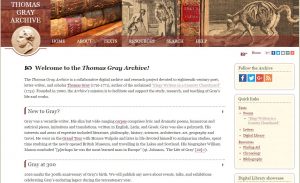Thomas Gray is most famous for his poem “Elegy written in a country churchyard.” It was an instant success, and even today it is the most visited page on the Thomas Gray Archive website.
There is more to Thomas Gray than just this one poem, however. Born in 1716, he was one of the key poetic figures in the early Romanticism of the mid-eighteenth century. The Thomas Gray Archive aims to make all his writing universally accessible online, along with important secondary works and crowd-sourced comments from today’s researchers.
The starting point for the Thomas Gray Archive was high quality digital scans of key editions of Gray’s work. As well as the images, the texts were transcribed using a standard text encoding format (TEI/XML). This allows the text to be searched, annotated, and analysed.
The Archive now contains the full-text of Gray’s published poetry, a selection of his prose writings, particularly his travel writing and literary criticism, and his correspondence. There is also a digital library with digital images of key editions of his works; translations into other languages; his prose and letters; and with audio tracks of readings of a small sample of his poems.
Not all of Gray’s poetry is as seemingly accessible as the “Elegy” or his humorous verse. In fact, given Gray’s background as a scholar poet, most of his poetry has always posed a considerable challenge even for professional readers of his works. In order to make his works more accessible to a wider readership, the Thomas Gray Archive includes a large number of explanatory notes and offers readers the opportunity to add their own notes and interpretations. This not only helps other readers access Gray’s work, but also demonstrates how an online archive such as this can transcend the single authority of a printed book, by presenting a range of authorities and readings.
Today, the Archive contains more than 3,500 notes on Gray’s 74 poems. These range from basic notes on the meaning of obsolete or obscure words to elaborate interpretative glosses on the use of figurative language, or references to places, people, and events that have influenced or shaped his works. Any contributions of notes or queries on any level and of any length are very welcome and will enhance all readers’ enjoyment of Gray’s work.
2016 marks the occasion of Gray’s 300th birthday, and anyone interested in Gray’s life and work is welcome to follow the hashtag #Grayat300 on Twitter where any talks, exhibitions, and events in the UK and beyond will be announced during the tercentenary year.

